八年级英语上册 第一单元总结 人教新目标版
- 格式:doc
- 大小:47.50 KB
- 文档页数:6
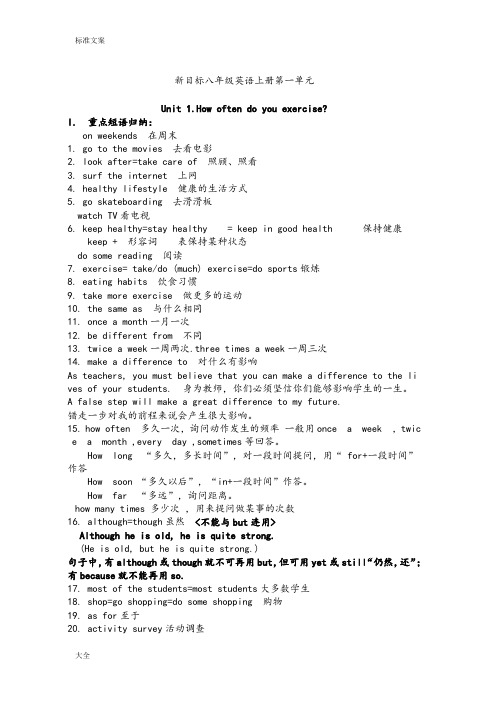
新目标八年级英语上册第一单元Unit 1.How often do you exercise?I. 重点短语归纳:on weekends 在周末1. go to the movies 去看电影2. look after=take care of 照顾、照看3. surf the internet 上网4. healthy lifestyle 健康的生活方式5. go skateboarding 去滑滑板watch TV看电视6. keep healthy=stay healthy = keep in good health 保持健康keep + 形容词表保持某种状态do some reading 阅读7. exercise= take/do (much) exercise=do sports锻炼8. eating habits 饮食习惯9. take more exercise 做更多的运动10. the same as 与什么相同11. once a month一月一次12. be different from 不同13. twice a week一周两次.three times a week一周三次14. make a difference to 对什么有影响As teachers, you must believe that you can make a difference to the li ves of your students. 身为教师,你们必须坚信你们能够影响学生的一生。
A false step will make a great difference to my future.错走一步对我的前程来说会产生很大影响。
15.how often 多久一次,询问动作发生的频率一般用once a week ,twice a month ,every day ,sometimes等回答。
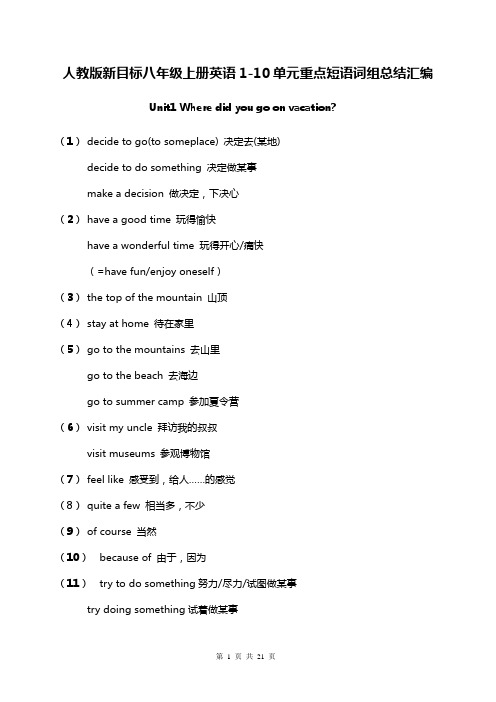
人教版新目标八年级上册英语1-10单元重点短语词组总结汇编Unit1 Where did you go on vacation?(1)decide to go(to someplace) 决定去(某地)decide to do something 决定做某事make a decision 做决定,下决心(2)have a good time 玩得愉快have a wonderful time 玩得开心/痛快(=have fun/enjoy oneself)(3)the top of the mountain 山顶(4)stay at home 待在家里(5)go to the mountains 去山里go to the beach 去海边go to summer camp 参加夏令营(6)visit my uncle 拜访我的叔叔visit museums 参观博物馆(7)feel like 感受到,给人……的感觉(8)quite a few 相当多,不少(9)of course 当然(10)because of 由于,因为(11)try to do something努力/尽力/试图做某事try doing something试着做某事have a try 尝试一下(此处try为n.)(12)dislike somebody/something 厌恶/不喜欢某人/某物(13)be/get bored with 对……厌倦(14)have a great difference in…在……方面存在很大差异make a difference 有影响,有转折,创造不同/有所成就be different from…与……不同(15)by oneself 某人独自(= on one's own)Unit2 How often do you exercise?(1)at least 至少,不少于,起码at most 至多,最多,不超过(2)such as 例如(3)more than 多于less than少于(4)use the Internet 使用网络(5)watch television/TV看电视(6)read English books 看英语书籍(7)go online 上网go shopping 去购物(8)eat vegetables and fruit 吃水果和蔬菜(9)most of the time 大部分时间(10)stay up late 熬夜, 晚睡(=burn the midnight oil)(11)healthy habits健康的习惯(12)Old habits die hard旧习难改(13)do housework 做家务help with housework 帮忙做家务do homework 做家庭作业(14)junk food垃圾食品fast food快餐,速食instant noodles方便面instant coffee速溶咖啡(15)hardly ever 几乎从不(16)once a day一天一次once a week一周一次once a year一年一次once again再次(17)twice a day一天两次twice a week一周两次twice a year一年两次once or twice一两次,偶尔(18)be full of sth. (有)大量的,丰富的(=be filled with sth.)(19)a full bottle of wine一满瓶葡萄酒a full day of…一整天的……a full life一个经历丰富的人生the full story全部情况(20)swing dance摇摆舞(21)be good for one’s health对某人身体健康好be bad for one’s health 对某人身体健康有害(22)keep healthy 保持健康stay healthy 保持健康healthy lifestyle健康的生活方式healthy food有益健康的食物(23)one/a hundred percent百分百one percent 百分之一fifty percent百分之五十one percent of students…百分之一的学生……how many percent of the students…? 百分之几/多少的学生……?(24)常见的频度副词排序(程度从高到底)如下:always 总是100%almost always 几乎总是90%usually 通常80%often 经常60%sometimes 有时40%seldom 很少20%hardly ever 几乎不曾5%almost never 几乎从不 2%never 从不0%(25)how often…? 问频率,意为“多久一次”how soon…? 问将来,意为“多久以后”how long…? 问时间段,意为“多久”,“多长时间”(26)sometimes是副词,意为“有时”,常用于一般现在时,表示频率some times意为“几次;几倍”sometime意为“某时”,可用于过去时或将来时some time意为“一段时间”(27)be good for对……有益be good at 擅长……be good to 对……友善Unit3 I’m more outgoing than my sister.(1)care about 关心,在意care for 关心,照顾,喜欢(2)be different from 与……不同/有差异(3)bring out 使呈现,使表现出(4)the same as 和……相同/一致(5)in fact 事实上,实际上(6)be similar to 与……相似的(7)primary school 小学(8)be talented in在……方面有天赋(9)do the same things 做同样的事情(10)be good at sports 擅长运动(11)make sb. laugh让某人笑laugh at sb.嘲笑/取笑某人laugh with sb.与某人同声笑laugh loudly 大声笑(12)be quiet/keep quiet 保持安静(13)win a competition赢得一场比赛competition and cooperation 竞争与合作(14)true or false 是非,正误(15)be serious about 对……是认真的take it seriously 认真对待(16)It is (not)necessary to do sth. (没)有必要做某事(17)touch my heart触动我的心灵in touch with 和……有接触/有联系get in touch 取得联系keep in touch with 与……保持联系(18)break one’s arm摔断了胳膊break the rule违反规则(19)share…with sb.与某人分享某物lion’s share 最大的份额(20)collect information 收集信息get information 得到信息receive information 收到信息provide information提供信息a piece of information 一条消息(21)“the+比较级,the+比较级”表示“越……,就越……”The more, the better. 越多越好Unit4 What’s the best movie theater?(1)(be) close to 离……近(=next to)close friends 密友(=bosom friends知心朋友)a close game势均力敌的比赛(2)big screens 大屏幕(3)think about/ of 思考,考虑(4)do a survey of 做……的调查(5)as for 至于(6)win the prize for 获得……奖(7)the worst service 最差的服务(8)the cheapest price 最便宜的价格(9)in the south of China 在中国南部(10)talent show 才艺表演(11)have ...in common 有相同特征(12)all kinds of 各种各样的(13)be up to 是……的职责(14)play a role in…在……中发挥作用(=play a part in…)(15)make up 编造,化妆,组成(16)for example 例如(17)唱快歌sing fast songs(18)take ...seriously 认真对待……(19)come true 实现(20)be careful of 当心,小心(21)look for 寻找(强调动作)find 找到(强调结果)(22)act as 作为,担当,充当(23)How do/does sb. like ...? 意为“某人认为……怎么样?”(=“What do/does sb. think of...?”或“What do/does sb. think about ...?”)(24)so far 到目前为止,迄今为止(= till now)Unit5 Do you want to watch a game show?(1)action movie 动作片(2)find out 查明,弄清(3)take sb’s place 代替,替换(=take the place of sb.)(4)be ready to do sth. 愿意做某事get ready for 为……做准备,强调动作be ready for 为……做好了准备,强调状态get sth. ready 把某物准备好(5)do a good job干得好(6)dress up 装扮,乔装打扮dress up (in) 穿上……盛装,用……装饰dress up as sb/sth. 装扮成某人或某物(7)talk show 脱口秀(8)talent show 才艺表演(9)can’t stand 受不了,不能忍受(10)soap opera肥皂剧(11)plan to do sth. 计划去做某事make a plan/plans 制定计划(12)sth.+happens/happened +to+sb. 某人发生某事sb. Happens/happened to do sth. 某人碰巧做某事(13)happen 偶然发生(无被动形式)take place 有计划发生(无被动形式)(14)expect (sb.) to do sth. 期望(某人)去做某事be expected to do sth. 被期望去做某事(15)be famous for... 因......而著名be famous as... 作为......而出名(16)good luck to sb. 祝某人好运bad luck 倒霉,坏运气(17)stand against 反对stand for 代表,表示stand out 突出;显著(18)appear to do sth. 似乎在做某事(19)succeed in doing sth. 成功做某事(be successful in doing sth.)(20)common names 常见的名字common mistakes 常犯的错误common sense 常识common interest 共同的兴趣common language 共同语言common market共同市场(21)an ordinary worker 一个普通工人ordinary-looking 相貌平常的(22)normal temperature 正常体温normal state 正常状态(24)hope for sth. 希望得到某物hope to do sth. 希望做某事(25)wish sb. sth. 希望某人有某物wish to do sth. 希望做某事wish sb. to do sth. 希望某人做某事(hope没有这种用法)Unit6 I’m going to study computer science(1)write down 写下,记下(2)have to do with 关于,与……有关系have nothing to do with…与……无关(3)take up 学着做,开始做;占据,占用(4)agree with 同意,赞成(后面接表示人或表示“意见,观点”的词)agree to 赞同,同意(后面接表示计划,提议,办法,安排等词,to是介词)(5)personal improvement 自我改进(6)make promises 许诺give a promise 许下诺言keep a promise 信守诺言(=keep one’s word)carry out a promise 履行诺言break a promise 违背诺言promise to do sth. 答应/许诺做某事(7)have something in common 有共同点(8)improve relationships 改善关系(9)at the beginning 在……开始(10)for this reason因为这个原因(11)send for 派人去叫send away 派遣,解雇send off 送别,差遣send up 发射(12)make a resolution做决定,下决心(13)make sure(of)确信(=be sure)(14)discuss sth. with sb. 和某人谈论某事(15)grow up 成长,长大grow into 长大成为(16)be going to do sth. 打算,准备,计划做某事(将来时)(17)make a plan for…为……制定计划(18)a kind of 一种all kinds of 各种各样的kind of 有点(= a little)Unit7 Will people have robots? (1)space station太空站(2)over and over again 多次,反复地(3)hundreds of 数以百计,许多,大量(4)be able to do sth. 能够做某事be unable to do sth. 不能做某事(5)fall down 倒下,跌倒,倒塌fall asleep入睡fall behind落后于(某人或某物)fall in love with喜爱,爱上fall off 掉下fall over 跌落,被绊倒fall into落入,陷入A fall into the pit, a gain in the wit. 吃一堑,长一智(此处fall为n. 跌落)(6)look for寻找(强调动作)(7)play a part in sth.参与某事(= play a role in sth.)play a part in doing sth. 参与做某事(8)in 100 years 一百年以后(9)help with the housework帮忙做家务(10)seem impossible好像不可能(11)make robots look like humans使机器人看起来和人类一样(12)for example例如(13)have many different shapes有很多不同的外形(14)air/water pollution 空气/水污染noise pollution 噪音污染environmental pollution “环境污染(15)believe sb. 相信某人说的话believe in sb. 信任某人,相信某人的人格(16)be free to do sth. 自由地做某事(17)try sth. 尝试某事try to do sth. 尽力做某事try doing sth. 试着做某事try one’s best to do sth. 尽某人最大努力做某事(= do one’s best to do sth.)try on试穿try out 试用,试验have a try 试一试(18)look like看起来像……(应用范围最广,除了描述人、物之外,也能抽象表达事件或现象)take after像……,与……相似(最常见的是用在有血缘关系的亲子之间,外貌用的最多,也能够用在性格脾气这些内在特质上)be similar to 与……相似(一般用在相近似的物品和情境的对比上)Unit8 How do you make a banana milk shake?(1)p our…into …把……倒进……里(通常强调倾倒液体)put…into…把……放进……里(既可以放液体,也可以放固体)pour out 倒出(2)t urn on 接通,打开(电源开关)turn off 关闭,熄灭(灯、煤气等)turn up (把音量)调大,调高turn down (把音量)调小,调低turn in 上交turn into使成为;翻译成turn to转向turn over翻转(3)cut up 切碎(4)mix up混合在一起(5)peel the bananas 剥香蕉(6)a cup of yogurt 一杯酸奶(7)five spoons of honey 五勺蜂蜜(8)add…to…把……加到……add to增加;增添(其中to是介词,后接名词或代词)add up 把……加起来add up to 总计,加起来结果是(9)celebrate with 用......庆祝(10)a piece of art一件艺术品a piece of一张,一片,一件,一条in pieces 碎片,碎块(11)cover…with…用......覆盖be covered with 被……覆盖(12)at first 起初,首先from first to last自始至终first of all 首先,第一(13)be filled with 充满......(= be full of)(14)put away把……收起来放好put on穿上put off推迟,延期put out熄灭put down放下put up建造;挂起;举起put…on…把……放在……上put together 放在一起(15)sth. needs doing 某物/事需要被做=sth. needs to be done(16)have a big meal 吃大餐(17)it’s time to do sth 到/是做某事的时候了(=it’s time for doing sth/ sth)(18)make sb. sth. = make sth. for sb. 为某人做某物Unit9 Can you come to my party?(1)prepare sth. 准备......prepare to do sth. 准备做某事prepare for an exam 为考试做准备prepare for (doing)sth. 为某事做准备prepare sth. for... 为……准备某物make preparations for 做准备(2)hang out闲逛,徘徊,逗留(=hang about)hang up挂断(电话)hang on不挂断(3)take a trip 去旅行(4)reply to(sb./sth.) 对......作出回答或答复reply for 致答辞;谢辞a reply to... 对......的答复in reply (to) 作为(对……的) 答复,为答复……(5)hear from sb. 收到某人来信(6)the day after tomorrow后天(7)another time 别的时间(8)look forward to 盼望,期待(9)turn down 拒绝(10)the day before yesterday前天(11)have the flu 患流感(12)go to the doctor 看医生(13)come to the party来参加聚会(14)meet friends见朋友(16)have to 不得不(16)invite sb to do 邀请某人做某事invite sb to someplace 邀某人去某地invite sb. for a drink 请某人喝酒(17)refuse sb. 拒绝某人refuse (sb.) to do 拒绝某人去做某事refuse sb. sth.为某事拒绝某人(作为及物动词)(18)catch one's breath 喘气,吓一跳,(由惊吓)暂时停止呼吸catch out 发觉某人的过失/错误,找破绽catch up with赶上(19)to one’s surprise 使某人吃惊的是……in surprise 吃惊地be surprised at/about 对……感到吃惊/意外(20)too much强调much,修饰不可数名词much too强调too,修饰形容词或副词(21)thanks for…为……而感谢,后接名词、代词或动名词thanks to 幸亏,由于thank sb. for sth. 为某事感谢某人be thankful to sb. for sth. 因某事而对某人心存感激(22)be busy doing sth. 忙于做某事be busy with sth. 忙于……(23)call sb. 给某人打电话(=ring sb.phone sb.ring sb. upgive sb. a callgive sb. a ringmake a phone call to sb.)(24)look forward to期待,盼望(to是介词,后面接名词,代词或动名词作宾语)(25)not…until…直到……才(26)have to 客观上不得不must主观上必须(27)can’t help doing sth 禁不住做某事help oneself to 随便用……with the help of =with one’s help在……的帮助下help sb. out 帮助某人摆脱困境help sb.(to)do sth. 帮助某人做某事Unit10 If you go to the party, you’ll have a great time! (1)keep…to oneself保守秘密;不与人来往,不交际keep doing sth. 继续做某事,保持某种状态(2)in the end/at last 最后,终于(3)make a mistake/make mistakes 犯错误by mistake错误地(不是故意做某事)(4)too…to…太……而不能……(5)advise sb. (not)to do sth. 建议某人(不)做某事(6)be angry with sb. 生某人的气be / get angry at / about sth. 因某事而生气(7)cut...in half 把……切成两半/一切为二be halfway to …完成了或做了事情的一部分(此处to是介词)(8)have lots of worries 有很多烦恼(9)the first step to do sth. 做某事的第一步(10)ask for advice 寻求建议a piece of advice一条建议give sb. advice (on) 给……提(有关……)的建议take one’s advice 听从某人的建议(11)have problems with…在……某方面有问题(12)run away from 逃离(13)solve (=deal with)problems 解决问题(14)go to the party 参加聚会go fishing 去钓鱼(15)be upset with sb. 生某人的气upset oneself 使某人自己心烦气乱(16)do enough exercise 做足够的运动(17)cook/make dinner/supper 做晚饭(18)have lots of money 有很多钱(19)eat too much 吃得太多(20)help others 帮助别人(21)a great soccer player 一个伟大的足球运动员(22)travel around the world 周游世界(23)have / be an experience有/是一次经历be experienced in 在……方面有经验have no experience at all 完全没有经验rich experience 丰富的经验practical experience 实务经验,实践经验(24)in the end 最后,终于(=at last,finally)by the end of到……为止,在……以前at the end of在……末尾,在……尽头(25)be afraid of/to do sth. 害怕做某事,不敢做某事(此外be afraid of还可以表示担心可能会发生某事)(26)worry about /over sth/sb担心某事/某人worry about=be worried about 担心(27)ask sb. to do sth. 请求/要求某人做某事其否定形式为ask sb. not to do sth.第21 页共21 页。

人教新目标英语八年级上册Unit 1 Where did you go on vacation?1.go on vacation 去度假= go for a vacation/holiday→(be) on/for a vacation 度假= have/take a vacation2.New York City = the city of New York3.visit sb./sp.(v.)= pay/have a visit to sb./sp.(n.) 参观/拜访某处/某人4.go to summer camp5.go with sb.→ go out with sb.6.Central Park 中心公园→ center: the center of …7.合成不定代词:⑴构成:①指人:someone/somebody “某人”(肯定句);anyone/anybody “某人(疑问句,否定句代替someone/somebody)”;“任何人(肯定句)”;everyone/everybody “每个人”;no one/nobody “没有人”;②指物:something “某物(肯定句)”;anything “某物(疑问句或否定句代替something)”;“任何东西(肯定句)”; everything “每件东西”;nothing “没有东西”;⑵用法:①合成不定代词作主语看成单数第三人称形式,谓语动词用单数形式;②形容词,动词不定式修饰合成不定代词,位于其合;⑶注意:①not … anything = nothing; not … anybody = nobody;②nobody/no one/nothing与none的区别:㈠nobody/no one “(只能指人)没有一个(人)”;不能与of连用;回答who问句;㈡nothing “(只能指物)没有一件(物品)”;不能与of连用;回答what问句;㈢none “(指人或物)没有一个(人)或(物品)”;可以和of连用;回答how many问句;⑷不定副词:somewhere “某处”(肯定句)anywhere “某处”(肯定句代替somewhere)/“任何地方”(肯定或否定句)everywhere “每个地方,到处”nowhere “没有地方(否定词)”※形容词修饰不定副词,也位于不定副词的后边。

02Unit1知识梳理Unit1. Where did you go on vacation?【重点短语】1. go on vacation 去度假2. stay at home 呆在家3. go to the mountains 上山/进山4. go to the beach 到海边去5. visit museums 参观博物馆6. go to the summer camp 去夏令营7. quite a few 相当多8. study for为……学习,9. go out 出去10. most of the time 大部分时间/绝大多数时间11. taste good 尝起来味道好12. have a good time 玩的开心13. of course 当然可以14. feel like 感觉像……/想要15. go shopping 去购物16. in the past 在过去17. walk around 绕……走18. too many 太多(可数名词前面)19. because of 因为20. one bowl of 一碗……21. find out 查出来/发现22. go on 继续23. take photos 照相24. something important 重要的事情25. up and down 上上下下26. come up 出来【重点句型】1. —Where did you go on vacation? 你到哪里去度假了?—I went to New York City. 我去了纽约城。
2. —Did you go out with anyone? 你出去带人吗?—No, No one was here. Everyone was on vacation.不,没有人在这儿。
大家度去度假了。
3. —Did you buy anything special? 你买了什么特别的东西吗?—Yes, I bought something for my father. 对,我给父亲买了一些东西。

人教新目标英语八年级上册Unit1 Where did you go on vacation?单元知识要点一、语法:一般过去时1. 概念一般过去时表示过去某个时间里发生的动作或状态;过去习惯性、经常性的动作、行为。
常与过去的时间状语连用。
例如:yesterday,the day before yesterday,last week,last month,in 2008,two days ago,this morning/afternoon/evening,when引导的状语从句(动词过去时),just now,in the old days,at that time,at that moment等。
2.谓语构成:动词的过去式动词过去式的变化:1)规则变化:2)不规则变化:3)have---had are---were is/am---was do---did二、一般过去时结构(1)有Be动词的过去时结构:肯定句:主语+was/were+其他Jim was angry last night..否定句:主语+was/were+not+其他Jim wasn’t angry last night..一般疑问句:was/were+主语+其他?Was Jim angry last night? 否定回答:No, 主语+ wasn’t/weren’t.No, he wasn’t.特殊疑问句:特殊疑问词+一般疑问句结构?How was Jim last night?(2)句中没有be动词的一般过去时的句子肯定:主语+动词过去式+其他eg. Jim went home yesterday.否定:主语+ didn’t +动词原形+其他Jim didn’t go home yesterday.一般疑问句:Did+主语+动词原形+其他Did Jim go home yesterday?肯定回答:Yes, 主语+ did. Yes, he did.否定回答:No, 主语+ didn’t. No, he didn’t.特殊疑问句:疑问词+did+主语+动词原形+其他?What did Jim do yesterday? Who went to home yesterday?复合不定代词和复合不定副词英语中,像something等这样的词叫复合不定代词;像somewhere这样的词叫复合不定副词。

人教新目标八年级英语上册Unit1知识点归纳1、动词过去式do- go- feel- forget- tell-is- are- take- buy-have-get-find-feed-see-ride-learn-stay-visit-arrive-enjoy-wait-decide-stop-jump-tast-seem-try-start-like-2、重点词组相当多当然给。
感觉因为待在家好久不见玩得愉快写日记到达许多发现,查明上上下下决定做某事一碗。
尝起来好足够的钱足够大一小时后再两小时如此。
以至。
太。
而不能。
一些特别的事去度假一些有趣的地方拍照为某人买某物3、考点归纳不定代词作主语作数看待形容词或to do修饰不定代词,要置于不定代词。
any用于句和句,some用于句。
单元检测1、There is with my computer. It doesn’t work now.A、something wrongB、wrong somethingC、anything wrongD、wrong anything2、Last night, we to the cinema(电影院)。
A、goingB、goesC、goD、went3、Everyone an English storybook.A、haveB、hasC、are havingD、to have4、The cakes__good.Can I have some more?A.sound B、taste C.feel D、smells5 、--Help__to some fruits--Thank youA、yourselfB、yourC、youD、you6、--__did you__the summer vacation--It was terrible.I have too much homework to do.A、What;thinkB、how;likeC、how;think of7、--I am going to London for a holiday next month.--A、It’s terribleB、Good jobC、What a pityD、Have a good time8、Where did Vera go vacation?A、forB、inC、onD、at9、-- did you go last week?--We went to Beijing.A、WhoB、WhenC、WhereD、How often10、He plays basketball so well! Who taught ?--He learnt it by .A、him;himB、himself;himselfC、him;himselfD、himself;him11、Tom didn’t go swimming the heavy rain.A、because ofB、soC、becauseD、though12、Where did you on vacation?--We to New York City.A、go;wentB、went;goC、goes;wentD、go;go13、the weather like last Monday?--It was sunny.A、How wasB、What isC、What wasD、How is14、Li Lei decided to Mount Emei next holiday.A、goB、to goC、goingD、went15、Were there many students here yesterday?--A、Yes, there wasB、Yes, there wereC、Yes, there isD、Yes, there are16、The room is , but he doesn’t have.A、big enough;enough moneyB、enough big;enough moneyC、big enough;money enoughD、small enough;enough money17、He stopped playing he heard his mother coming.A、becauseB、because ofC、thatD、so18、I’m thirsty. Could you give me?A、something to drinkB、something to eatC、anything to drinkD、anything to eat19、The coat was expensive that I didn’t buy it.A、veryB、soC、muchD、too20、The girl in red is new here, so people know her.A、a littleB、a fewC、littleD、few。
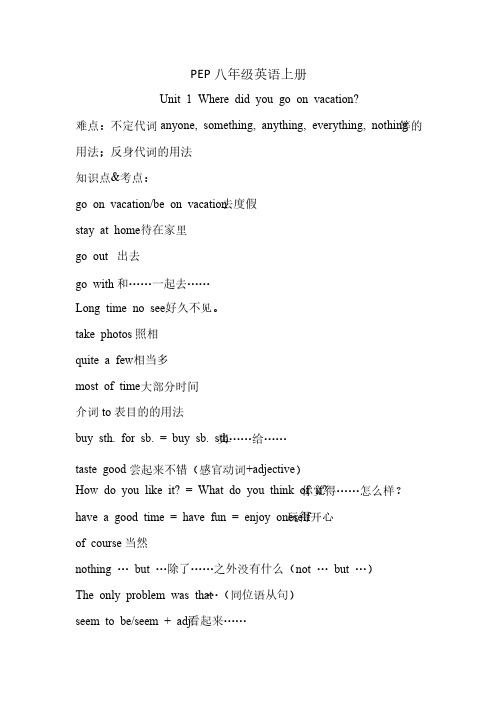
PEP八年级英语上册八年级英语上册Unit 1 Where did you go on vacation? 难点:不定代词anyone, something, anything, everything, nothing等的用法;反身代词的用法用法;反身代词的用法知识点&考点:考点:go on vacation/be on vacation 去度假去度假stay at home 待在家里待在家里待在家里go out 出去出去go with 和……一起去……和……一起去……Long time no see. 好久不见。
好久不见。
take photos 照相照相quite a few 相当多相当多相当多most of time 大部分时间大部分时间大部分时间表目的的用法介词to表目的的用法buy sth. for sb. = buy sb. sth. 买……给……买……给……taste good 尝起来不错(感官动词+adjective)How do you like it? = What do you think of it? 你觉得……怎么样?你觉得……怎么样?have a good time = have fun = enjoy oneself玩得开心玩得开心of course 当然当然nothing …but …除了……之外没有什么(not …but …)…)The only problem was that …(同位语从句)…(同位语从句)seem to be/seem + adj. 看起来……看起来……keep a diary 记日记记日记记日记 + at + 小地点小地点小地点arrive + in + 大地点大地点大地点 decide to do 决定做某事决定做某事决定做某事 try doing sth. 尝试做某事尝试做某事尝试做某事 try to do sth. 尽力做某事尽力做某事feel like 感觉到感觉到 feel like + n./ v-ing 想要……想要……ride … to …骑……到………骑……到……许多的:a lot of + 可数名词可数名词 lots of + 可数可数or 不可数名词不可数名词 I wonder that …我想知道………我想知道………我想知道…… in the past 在过去在过去在过去 enjoy doing sth. 享受做某事享受做某事享受做某事 walk around 到处逛逛到处逛逛感叹句:What + 冠词冠词 + adj. + n. + (it is) = How + adj. + 冠词冠词 + n. + (it is) start start doing doing doing sth. sth. 开始做某事开始做某事 stop stop doing doing doing sth. sth. 停止做某事停止做某事 finish finish doing doing sth. 结束做某事结束做某事because & so (不可同用)(不可同用)(不可同用) wait for …等待………等待……because of + n. a little/ a few 一些(两者的区别,以及与little/few 的区别)的区别) enough + n. / adj. + enough as + adj./adv. + as 和……一样……和……一样……one bowl of …一碗………一碗……along the way 沿着这条路沿着这条路沿着这条路 时间段+ later = after + 时间段……之后时间段……之后other, others, the other, the others, another on trip 在旅途中在旅途中find out 找到,找出找到,找出 / find 寻找寻找 / look for 寻找寻找寻找 so + adj. + that + 从句如此……以致……从句如此……以致……tell sb. (not) to do sth. 告诉某人(不要)做某事告诉某人(不要)做某事keep doing sth. / go on doing sth. 继续做某事继续做某事keep sth. + adj. 使……保持……状态使……保持……状态up and down (人)来来往往;(人)来来往往;(物)上上下下(物)上上下下in excitement = excitedly 兴奋地兴奋地come up / come out / come on / come in forget to do sth. 忘记做某事忘记做某事 forget doing sth. 忘记做过某事忘记做过某事忘记做过某事 like / dislike + n. / v-ing 喜欢/不喜欢某物/做某事做某事something + adj. ……的事情……的事情……的事情 Why not + v. = Why don ’t you + v. 为什么不……呢?为什么不……呢?Unit 2 How often do you exercise? 重点:1. How often 句型的运用;2. 2. 六个频度副词六个频度副词never, hardly ever, sometimes, sometimes, often, often, often, usually, usually, usually, always always 的差异、理解及使用;3. 频率数词once, twice 等的认识和运用;4. 一般现在时不同人称谓语形式的变化及一般疑问句的问答。
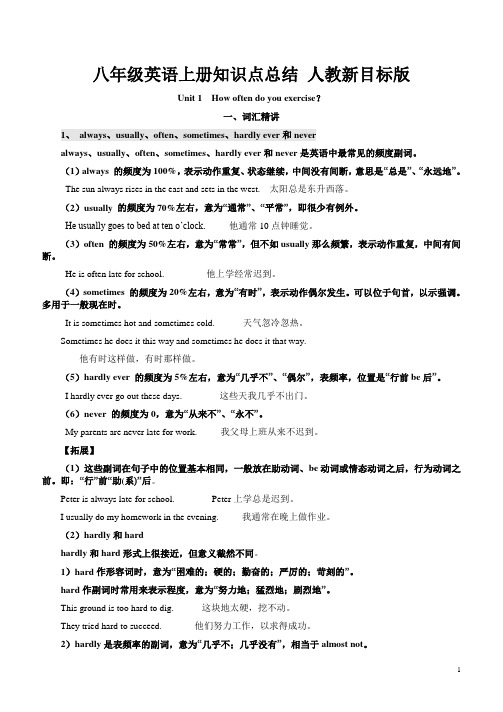
八年级英语上册知识点总结人教新目标版Unit 1 How often do you exercise?一、词汇精讲1、always、usually、often、sometimes、hardly ever和neveralways、usually、often、sometimes、hardly ever和never是英语中最常见的频度副词。
(1)always 的频度为100%,表示动作重复、状态继续,中间没有间断,意思是“总是”、“永远地”。
The sun always rises in the east and sets in the west. 太阳总是东升西落。
(2)usually 的频度为70%左右,意为“通常”、“平常”,即很少有例外。
He usually goes to bed at ten o’clock. 他通常10点钟睡觉。
(3)often 的频度为50%左右,意为“常常”,但不如usually那么频繁,表示动作重复,中间有间断。
He is often late for school. 他上学经常迟到。
(4)sometimes 的频度为20%左右,意为“有时”,表示动作偶尔发生。
可以位于句首,以示强调。
多用于一般现在时。
It is sometimes hot and sometimes cold. 天气忽冷忽热。
Sometimes he does it this way and sometimes he does it that way.他有时这样做,有时那样做。
(5)hardly ever 的频度为5%左右,意为“几乎不”、“偶尔”,表频率,位置是“行前be后”。
I hardly ever go out these days. 这些天我几乎不出门。
(6)never 的频度为0,意为“从来不”、“永不”。
My parents are never late for work. 我父母上班从来不迟到。
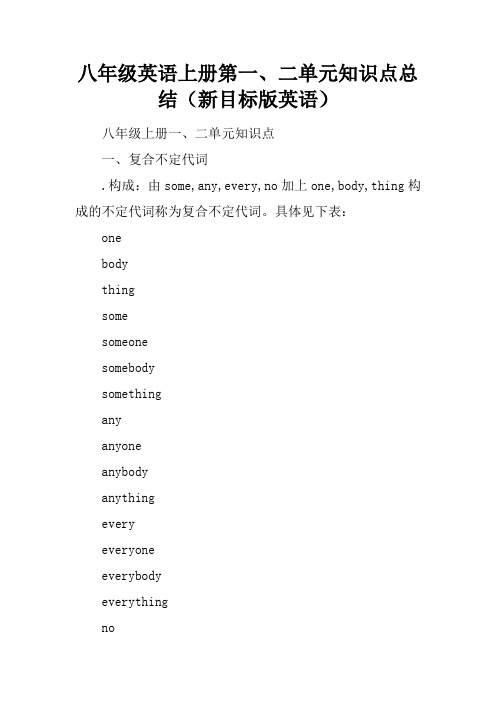
八年级英语上册第一、二单元知识点总结(新目标版英语)八年级上册一、二单元知识点一、复合不定代词.构成:由some,any,every,no加上one,body,thing构成的不定代词称为复合不定代词。
具体见下表:onebodythingsomesomeonesomebodysomethinganyanyoneanybodyanythingeveryeveryoneeverybodyeverythingnonoonenobodynothing2.用法:(1)复合不定代词被形容词、动词、不定式等修饰时,要放在它们的后面。
Ihavesomethingimportanttotellyou.我有重要的事情要告诉你。
Thereisnothingwrongwiththeradio.这个收音机没有毛病。
Doyouwantanythingtodrink?你想喝点什么吗?(2)复合不定代词作主语时,谓语动词用单数形式。
Everythingbeginstogrowinspring.春天万物开始生长。
Someoneiswaitingforyouatthedoor.有人在门口等你。
(3)肯定句中用含some,疑问句和否定句中用含any。
但在表示请求、建议、反问等的疑问句中,常用含有some 的不定代词。
wouldyoulikesomethingtoeat?你想要些吃的东西吗?(4)anyone,anything也可以用在肯定句中,前者表示“任何人”,后者表示“任何事”。
Anyonecandothis.任何人都会做这个。
Icananythingforyou.我能为你做任何事。
3.goonvacation“去度假”;vacation同义词为holiday,意为“假期”。
beonvacation“在度假”。
IwanttogoonvacationinHainanthiswinter.今年冬天我想去海南度假。
Theyareonvacationattheseaside.他们正在海边度假。


教学过程一:课堂导入八年级上册的课文已经全部结束,知识点还是挺多的,所以今天我们就一起来总结一下,八年级上册都有哪些知识点,以便为下册的学习打好基础。
二、复习预习老师可以先给学生们一些各种不同类型的语法题,让学生们先做,并且请他们来解答,从中检测学生们对上学期的语法学习中存在哪些盲点,这样讲解的时候可以有所侧重。
三知识讲解知识点1:人教新目标版八年级英语上册_Units_1-10单元知识点归纳1【考查点】Unit1 Where did you go on vacation?go on vacation去度假stay at home待在家里go to the mountains去爬山go to the beach去海滩visit museums 参观博物馆go to summer camp去参观夏令营study for为……而学习quite a few相当多have a good time玩得高兴feel like给…的感觉;感受到go out出去of course当然one bowl of… 一碗……go shopping去购物in the past在过去walk around四处走走the next day第二天drink tea喝茶find out找出;查明come up出来something important重要的事take photos照相up and down上上下下most of the time大部分时间go on继续because of因为taste good尝起来很好吃taste + adj. 尝起来… look+adj. 看起来… nothing…but+动词原形除了…之外什么都没有seem+(to be)+ adj. 看起来… buy sth for sb/buy sb sth.为某人买某物arrive in+大地点/ arrive at+小地点到达某地decide to do sth.决定去做某事try doing sth.尝试做某事try to do sth.尽力去做某事start doing/to do sth.开始做某事forget to do sth.忘记做某事forget doing sth.忘记做过某事keep doing sth.继续做某事enjoy doing sth.喜欢做某事want to do sth.想去做某事Why not do sth.?为什么不做……呢?stop doing sth. 停止做某事dislike doing sth. 不喜欢做某事so+adj.+that+从句如此…以至于… ask sb (not) to do sth. 叫某人(别)做某事tell sb. (not) to do sth. 告诉某人(别)做某事2【考查点】Unit2 How often do you exercise?help with housework帮助做家务on weekends在周末how often多久一次hardly ever几乎从不once a week每周一次twice a month每月两次every day每天be free有空go to the movies去看电影use the Internet用互联网swing dance摇摆舞play tennis打网球stay up late熬夜;睡得很晚at least至少have dance and piano lessons上舞蹈课和钢琴课go to bed early早点睡觉play sports进行体育活动be good for对……有好处go camping去野营not…at all一点儿也不… in one’s free time在某人的业余时间the most popular最受欢迎的such as比如;诸如old habits die hard积习难改go to the dentist去看牙医morn than多于;超过less than少于help sb with sth帮助某人做某事How about…? ...怎么样/…好不好?want sb to do sth想让某人做某事How many+可数名词复数+一般疑问句?…有多少…?It’s+ adj.+ to do sth. 做某事的……的。

人教新目标英语八年级上册Unit1 Where did you go on vacation?常用短语1.go on vacation去度假2.stay at home待在家里3.go to the mountains去爬山4.go to the beach去沙滩5.visit museums参观博物馆6.go to summer camp去参加夏令营7.quite a few相当多,不少 8.study for…为…而学习 9.go out出去,外出10.most of the time大部分时间 11.taste good尝起来好吃 12.of course当然,自然13.feel like给…的感觉,感受到 14.go shopping=do some shopping去购物 15.in the past在过去16.walk around四处走走 17.over an hour 一个多小时 18.too many people 太多的人19.get to the top到达顶部20.because of the bad weather因为坏天气21.something important重要的事22.another two hours另外两个小时23.the top of the hill山顶 24. one bowl of fish 一碗鱼肉25.go to the countryside 去乡下 26.in the shopping center 在购物中心 27.keep going 一直走28.have a fun(good)time玩得开心29.after three hours三个小时以后30.twenty minutes later20分钟后31.the next day第二天 32.find out找出,查明 33.take photos照相34.keep a diary记日记语法集萃1. seem +adj.(形容词)= seem to be +adj. (形容词)看起来… ; seem to do sth. 似乎要做某事2. decide to do sth. 决定做某事;decide not to do sth.决定不做某事3. try 的用法: 1) have a try 试一试 2) try to do sth. 尽力/ 设法去做某事3) try doing sth. 尝试着做某事4) try one’s best to do sth. 尽某人最大努力做某事。

新目标八年级英语上册第一单元Unit 1.How often do you exercise?I. 重点短语归纳:on weekends 在周末1. go to the movies 去看电影2. look after=take care of 照顾3. surf the internet 上网4. healthy lifestyle 健康的生活方式5. go skateboarding 去滑滑板watch TV看电视6. keep healthy=stay healthy = keep in good health 保持健康keep + 形容词表保持某种状态do some reading 阅读7. exercise= take/do (much) exercise=do sports锻炼8. eating habits 饮食习惯9. take more exercise 做更多的运动10. the same as 与什么相同11. once a month一月一次12. be different from 不同13. twice a week一周两次.three tim es a week一周三次14. make a difference to 对….有影响As teachers, you must believe that you can make a difference to the lives of your students. 身为教师,你们必须坚信你们能够影响学生的一生。
A false step will make a great difference to my future.错走一步对我的前程来说会产生很大影响。
15. how often 多久一次,询问动作发生的频率how many times 多少次,用来提问做某事的次数16. although=though虽然 <不能与but连用>Although he is old, he is quite strong.(He is old, but he is quite strong.)句子中,有although或though就不可再用but,但可用yet或still“仍然,还”;有because就不能再用so.17. as for至于18. activity survey活动调查19. do homework做家庭作业20. do house work 做家务事23. eat less meat吃更少的肉24. junk food垃圾食物25. be good for 对什么有益26. be bad for对什么有害27. want to do sth 想做某事28. want sb to do sth想某人做某事29. try to do sth 尽量做某事30. come home from school放学回家31. of course=certainly=sure当然32. get good grades取得好成绩33. some advice 一些建议some advice 中的advice 是不可数名词 a piece of advice 一则建议give advice 提出建议take one’s advice 采纳或听从某人的建议4. help sb to do sth帮助某人做某事=help sb with sth35. a lot of vegetables=many vegetables许多蔬菜36. hardly= almost not几乎不 hardly ever很少,几乎不,从不37. keep/be in good health保持健康38. your favorite program你最喜欢的节目39. Animal World 动物世界40. play soccer踢足球41.every day 每天every day 与 everyday1. every day 作状语,译为“每一天”。

人教新目标英语八年级上册Unit 1 sectionA语法知识点总结Unit 1 Where did you go on vacation?一般过去时态的概念:1.表示过去某时间发生的动作或存在的状态。
2.表示过去经常性习惯性的动作。
一般过去时常用的标志词有:yesterday,the day before yesterday,last week/month/year, just now, …ago,in+过去时间…一.用Be动词的一般过去时(1)肯定句式:主语+ was / were + 其它.(2)否定句式:主语+ wasn’t /weren’t+ 其它.(3)一般疑问句:Was/Were + 主语+ 其它?肯定回答:Yes,主语+ was / were .否定回答:No,主语+ wasn’t /weren’t.(4)特殊疑问词+was/were+主语+其他?肯定句:The air was clean yesterday.否定句:The air wasn't clean yesterday.一般疑问句:Was the air clean yesterday?肯定回答:Yes, it was.否定回答:No, it wasn't.特殊疑问句:How was the air yesterday?二.行为动词(v.)的一般过去时态(1)肯定句式:主语+ v-ed+ 其它.【do , does---did】(2)否定句式:主语+ didn’t + v原形+ 其它. 【did not = didn’t】(3)一般疑问句:Did + 主语+ v原形+ 其它?肯定回答:Yes,主语+did.否定回答:No,主语+did’t.(4)特殊疑问词+did+主语+v.原形+其他?肯定句:I rode a horse last Sunday.否定句:I didn‘t ride a horse last Sunday.一般疑问句:Did you ride a horse last Sunday? 肯定回答:Yes, I did.否定回答:No, I didn't.特殊疑问句:(1)What did you do last Sunday?(2)When did you ride a horse?三、动词过去式的构成1. 规则动词的过去式1) 一般情况下,在动词原形后面加-ed。
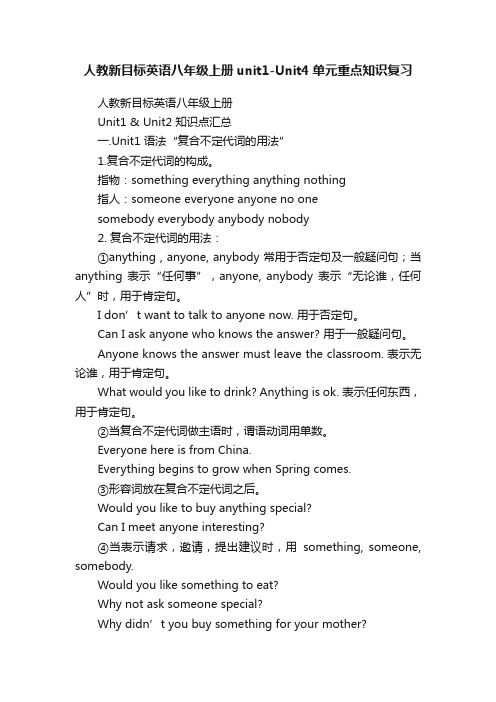
人教新目标英语八年级上册unit1-Unit4单元重点知识复习人教新目标英语八年级上册Unit1 & Unit2 知识点汇总一.Unit1 语法“复合不定代词的用法”1.复合不定代词的构成。
指物:something everything anything nothing指人:someone everyone anyone no onesomebody everybody anybody nobody2. 复合不定代词的用法:①anything , anyone, anybody 常用于否定句及一般疑问句;当anything 表示“任何事”,anyone, anybody 表示“无论谁,任何人”时,用于肯定句。
I don’t want to talk to anyone now. 用于否定句。
Can I ask anyone who knows the answer? 用于一般疑问句。
Anyone knows the answer must leave the classroom. 表示无论谁,用于肯定句。
What would you like to drink? Anything is ok. 表示任何东西,用于肯定句。
②当复合不定代词做主语时,谓语动词用单数。
Everyone here is from China.Everything begins to grow when Spring comes.③形容词放在复合不定代词之后。
Would you like to buy anything special?Can I meet anyone interesting?④当表示请求,邀请,提出建议时,用something, someone, somebody.Would you like something to eat?Why not ask someone special?Why didn’t you buy something for your mother?Unit2 语法“频率副词”How often 常用于对频率的提问,意为“多长时间一次”,其答语可以是once/ twice / three times a week; always/ usually/ often/ sometimes/ hardly ever/ never 等表示时间频率的副词及短语。
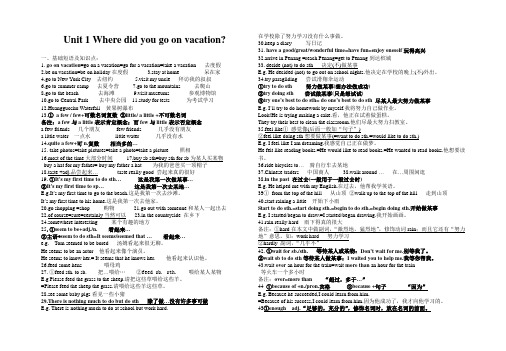
Unit 1 Where did you go on vacation?一、基础短语及知识点:1. go on vacation=go on a vacation=go for a vacation=take a vacation 去度假2.be on vacation=be on holiday在度假3.stay at home 呆在家4.go to New York City 去纽约5.visit my uncle 拜访我的叔叔6.go to summer camp 去夏令营7.go to the mountains 去爬山8.go to the beach 去海滩9.visit museums 参观博物馆10.go to Central Park 去中央公园11.study for tests 为考试学习12.Huangguoshu Waterfall 黄果树瀑布13.①a few / few+可数名词复数②little/ a little +不可数名词备注:a few与a little表示肯定概念;而few与little表示否定概念a few friends 几个朋友few friends 几乎没有朋友a little water 一点水little water 几乎没有水14.quite a few+可n.复数相当多的…15.take photos=take pictures=take a photo=take a picture 照相16.most of the time大部分时间17.buy sb sth=buy sth for sb为某人买某物buy a hat for my father= buy my father a hat 为我的爸爸买一顶帽子18.taste +adj.品尝起来…taste really good 尝起来真的很好19.①It’s my first time to do sth…这是我第一次做某事…②It’s my first time to sp…这是我第一次去某地…E.g.It’s my first time to go to the beach.这是我第一次去沙滩。

人教新目标英语八年级上册Unit1 Where did you go on vacation 重点短语1.visited museums 参观博物馆2.went to summer camp/ the mountains 去夏令营/爬山3.stayed at home 呆在家4.go on vacation 度假5.study for tests 准备考试6.meet anyone interesting 遇见有趣的人7.do/ Buy anything special做\ 买特别的东西8.anywhere interesting 有趣的地方9.take quite a few photos照很多照片10.most of the time 大多数时候11.taste really good/ great.尝起来真好极了12.buy something for somebody= buy somebodysomething 为某人买某物13.in the countryside在农村14.at a restaurant在饭店15.keep a diary写日记16.arrive in / at= get to = reach 到达….17.decide to do something 决定做……18.near our hotel在我们的宾馆附近19.try paragliding ( try doing something) 尝试滑翔(尝试做….)20.feel like doing something 感到喜欢做……,好像……21.ride bicycles to Georgetown 骑自行车到了Georgetown22. a lot of new buildings 许多新建筑23.many of the old buildings许多老建筑24.Chinese traders from 100 years ago 100年前的中国商人25.enjoy walking around the town 喜欢在市里漫步26.walk up to the top of the hill步行上山顶27.start raining a little 开始下小雨28.take the train乘火车29.waited over an hour for the train 等了两个多小时的火车30.enough money 足够的钱31.old enough足够老32.another two hours 另外两个小时33. a bag with some food and water装有食物和水的口袋34.so… that…如此……以至于……35.keep going继续走36.go on继续37.jump up and down跳上跳下38.in excitement兴奋地39.twenty minutes later20分钟以后40.bring an umbrella带雨伞41.home cooking家常菜重点句子42.It was my first time there.这是我第一次到那儿。
人教版八年级英语上册第一单元复习资料(1)八年级上册: Unit 1 How often do you exercise?考点扫描:一)习惯用语:watch TV 看电视go to the movies 去看电影on weekends 在周末hardly ever 几乎不how often 多久一次once a week 一周一次twice a month 一月两次do homework 做家庭作业the result of……的结果as for 至于,对于junk food 垃圾食品be good/bad for 对…有益/害eating habits 饮食习惯try to do sth.尽力做某事try doing sth.尝试做某事lots of=a lot of许多of course/Sure当然come home from school从学校来到家look after=take care of 照看;照顾a healthy lifestyle 一种健康的生活方式be the same as…和…相同be d ifferent from…和…不同want to do sth.想要做某事want sb. to do sth.想要某人做某事make a big difference 有很大不同keep healthy = stay healthykeep in good health =keep fit 保持健康surf the Internet上网get good grades 取得好成绩二)重点句型:1.What does she do on weekends? 她在周末常干什么?2.She often goes to the movies. 她经常去看电影。
3.I watch TV every day. 我每天都看电视。
4.We often surf the Internet. 我们经常上网。
5.I read English books about twice a week. 我大约一周两次看英语书。
6.I shop once a month. 我每月购物一次。
7.She says it’s good for my health. 她说这对我的健康有利。
8.How often do you eat junk food? 你多久一次吃垃圾食品?9.I look after my health. 我照看我的健康。
10.My eating habits are pretty good. 我的饮食习惯相当好。
三)交际用语:What do you usually do on weekends? I usually play soccer.What do they do on weekends? They often go to the movies.What does he do on weekends? He sometimes watches TV.How often do you shop? I shop once a month.How often does Cheng watch TV? He watches TV twice a week.四)主题写作:提供出一些信息,让你写一篇关于你或者别人的生活习惯及其影响.词语点击:1.exercise: [′eksəsaiz]1)作可数名词用,“练习,习题,体操,功课,操练”等,常用复数。
I'm doing my exercises.我在做练习/功课。
Doing morning exercises is helpful to our health.做早操对我们的健康是有益的。
2)作不可数名词用,“锻炼,运动”。
You are weak because of the lack of exercise.你身体弱是因为缺少锻炼。
Take more exercise,and you will be healthy.多多锻炼,你会健康的。
3)作动词用,“训练,锻炼”。
You must exercise yourself in order to be stronger and healthier.为了更健康更强壮,你必须锻炼自己。
You don't exercise enough.你锻炼不够。
﹝作不及物动词﹞作动词用还有“履行职责,行使全力”等意思。
You must exercise your own duty.你必须履行你自己的职责。
2.hardly: [′hɑ:dli]1)副词adv.hardly 是"几乎不", hard 也可是副词,“努力地,猛烈地”2)hardly 是位于句首时,句子要用倒装.如:Hardly did I believe what you said. 我几乎不相信你说的话.Hardly did I arrive at the railway station when the train started.我一到火车站,火车就开走了.3)句子中有 hardly 时,其反意疑问句的疑问部分应该用肯定形式. 如:He can hardly understand it ,can he ? 他几乎听不懂,是吗?hardly ever 很少(几乎从不,难得)例句与用法:My grandfather loves his island. He hardly ever sets foot in the city.我祖父热爱他那个小岛,他几乎从不进城来。
He hardly ever (very seldom) goes to bed before midnight.他很少在午夜以前就寝.(同学们要记住:早睡早起是“一”个好习惯啦!Going to bed early and getting up early is a good habit.)3.ever: [′evə]ever用作副词,意为“曾经、以前”Did you ever see the UFO?你还见到过飞碟?When you were working there,did you ever meet a foreigner?你在那里工作时曾见过外国人吗?4.once: [wʌns]1)副词adv. 一次 I have been there once.我到过那儿一次。
I see them once every two months.我每两个月与他们见一次面。
2) 连接词conj.一旦,一经...便Once you get into a bad habit, you'll find it hard to get out of it.一旦染上坏习惯,想改掉就难了。
5.twice: [twais]副词 adv.:两次,两回; 两倍。
He comes to work twice a week. 他每周来上两次班。
The dining-room is twice as big as the kitchen. 餐厅是厨房的两倍大。
6.active: [′æktiv]形容词adj.活跃的;活泼的Mrs. Brown is over 80 and not very active now.布朗太太已八十多岁,现在不大活动了。
提示:active的名词形式为activity,意为“活动”。
7.about: [ə′baut]1)副词 adv.大约;几乎John is about the same age as Tom. 约翰和汤姆的年龄相仿。
2)介词 prep. 关于,对于My mother often spoke to me about you. 家母过去常和我谈起你。
k: [milk]1)名词n.乳; 牛奶(不可数名词)You have to keep watching to prevent the milk from boiling over.你要看住, 不要让牛奶溢出来。
2)动词v. & vi.产奶; 挤奶The cow is milking heavily.这头奶牛出奶率很高。
9.drink: [driŋk]1)动词 vt. & vi.喝(酒), 饮I don't drink and I've never played cards.我不喝酒, 也从不打牌。
2)名词n.既可做可数名词,又可作不可数名词He likes a drink when he returns home from work.他喜欢下班回家后喝一杯酒。
food and drink食物和饮料10.health: [helθ]名词n. 1)健康[U]Smoking does harm to health. 吸烟有损健康。
2.)健康状况[U]She is in poor health.她身体不好。
拓展:health的形容词为healthy,healthy的比较级为healthier最高级为healthiest,反义词为unhealthy。
11.habit: [ˊhæbit]名词n. 习惯, 习性。
Habit cures habit. [谚]新习惯可以改掉旧习惯。
be in / have a habit of (doing sth.) 惯于, 有某种习惯His uncle has a bad habit of smoking.他的叔叔有一种抽烟的坏习惯。
12.try: [trai]1)动词v.tried(过去式) trying(现在分词)tries(单数第三人称形式)试图,努力;努力做或完成(某事)。
tried to ski.试着滑冰2)名词n.尝试,常用于短语have a try,等于have a go【拓展】try on 试穿(衣帽等)try one's best to do sth.尽最大力量做某事13.same:[seim]形容词adj.:同一的I live in the same house as he.我跟他同住一所房子。
反义词为different。
Same常与the连用,常见短语有:almost the same几乎一样 the same as 和……一样This is the same skirt that she was wearing a year ago.这就是她一年前穿的那条裙子。
14.different: [ˊdifərənt]形容词adj.1) 不同的[(+from)]Their school is different from ours. 他们的学校与我们的不同。